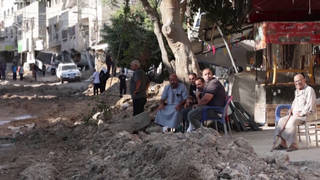
Related
Guests
- Holger Starkdeputy editor-in-chief and head of the investigative team at Die Zeit, Germany’s biggest weekly newspaper.
Ukraine’s government has denied a Wall Street Journal report this week that Kyiv approved the plan to blow up the Russian-owned Nord Stream pipelines in 2022. According to the newspaper, a crew of Ukrainian civilians and active-duty soldiers used a rented yacht to reach the pipelines, which deliver Russian natural gas to Germany via the Baltic Sea, and used explosives to sever three of the four pipelines. This comes as Poland says it was unable to carry out a German arrest warrant for a new suspect in its investigation into the Nord Stream attack, a 44-year-old Ukrainian diving professional who is alleged to have attached explosive charges to the pipelines. Polish authorities say the suspect fled to Ukraine in July. For more on the investigation, we speak with German journalist Holger Stark, deputy editor-in-chief and head of the investigative team at Die Zeit, who has been reporting on the Nord Stream attack for years.
Transcript
AMY GOODMAN: This is Democracy Now!, democracynow.org. I’m Amy Goodman.
We end today’s show looking at how a top adviser to the Ukrainian President Volodymyr Zelensky has denied a report in The Wall Street Journal that his government approved a plan to blow up the Nord Stream pipelines nearly two years ago.
In September of 2022, a six-member crew of Ukrainian civilians and active-duty soldiers reportedly used a rented yacht, satellite navigation, sonar, and seabed maps to reach the Nord Stream pipelines on the bottom of the Baltic Sea. Then divers used an explosive and timer-controlled detonators to rupture the pipelines, triggering a massive release of methane gas. The blasts severed three of the four pipelines that carried Russian gas to Europe.
President Zelensky reportedly approved the plan, but later tried to stop it after a Dutch intelligence agency learned of the plot and told the CIA. But his commander-in-chief at the time, Valery Zaluzhnyi, forged ahead despite Zelensky’s U-turn.
This comes as Poland says it was unable to carry out an arrest warrant issued by Germany for a new suspect in the investigation into the Nord Stream attack, a 44-year-old Ukrainian diving professional identified as “Volodymyr Z.” who’s alleged to have attached explosive charges to the pipelines. Polish authorities say the suspect fled to Ukraine in July.
For more, we’re joined in Berlin by Holger Stark, deputy editor-in-chief and head of the investigative team at Germany’s biggest weekly, Die Zeit. He co-wrote this new exclusive report, “Has the mystery of the Baltic Sea attack been solved?” as well as last year’s deep dive, headlined “Who Blew Up Nord Stream?”
Welcome to Democracy Now!, Holger. Can you just lay out what you found? We summarized your results.
HOLGER STARK: Good morning, Amy, and thanks for having me.
Yes, we know, after a almost two-year-long investigation now, that at least one Ukrainian citizen is highly suspected to be a part of this six-people crew that blew up Nord Stream. He’s a father of a son. He was born in Kyiv. He is an engineer by training but also served in the Ukrainian army. We know that he’s a patriot. He posted on Facebook, together with his colleagues, highly patriotic Ukrainian posts, that he would defend until death his home country.
And his traces were found by German investigators. He was brought by a shuttle service, a driver from Ukraine, from Kyiv over Poland, via Poland to Germany. A speed camera, funnily, made a photo of that transport crew. He was identified on that photo, as well. So the German authorities are deeply convinced that he was on that sailing boat.
He probably had a special role in that attack, because he is a highly skilled diver. He’s capable of operating in the depth of 240 feet, which is only something that a few divers are capable of. It needs special training, special expertise. And remember, those pipelines of Nord Stream were in a depth of exactly that 240 feet in the Baltic Sea. So he probably was one of the guys who dove down to the bottom of the Baltic Sea and was bringing the charge to the pipelines.
AMY GOODMAN: And if you can explain, who investigated, in terms of countries — Sweden and Denmark both leading investigations into the blast, but closed them? And yet you have Germany — you’re in Berlin — which continued, and you are now reporting what you think are their findings.
HOLGER STARK: Yes. It was initially a four-country investigation. Denmark and Sweden, you’ve mentioned that. The Netherlands also investigated. And, of course, Germany, because it disrupted the gas transport pipeline between Russia and Germany, and also this sailing boat departed here from a German harbor. Now it’s only the German investigation; everything else is closed.
The Germans merged all forensic indications. And in June, they came to the conclusion that this is enough, that they probably were able to identify at least parts of that crew. They went to a court and obtained that arrest warrant. They hoped, significantly, to get hold of that guy, who used to live in a suburb of Warsaw, the capital of Poland. So, in June, they transferred the arrest warrant to the Polish government. They also spoke on the highest levels of the government — to the government in Poland and were really hoping that the Polish authorities would arrest the 44-year-old diver. He then disappeared in July suddenly. And the saying in Berlin is that there’s a high plausibility that someone within the Polish authorities, the Polish government, tipped off the guy. Remember, the old Polish government, who used to be in charge last year, was highly in support of Ukraine, and there were a lot of people, including the government, who said, “Those guys who blew up Nord Stream, they our heroes and not criminals.”
AMY GOODMAN: I want to go to President Biden. In February of 2022, he holds a news conference, a joint one with German Chancellor Olaf Scholz, and Biden brings up the future of the Nord Stream pipeline.
PRESIDENT JOE BIDEN: If Russia invades, that means tanks or troops crossing the border of Ukraine again. Then there will be — there will be no longer Nord Stream 2. We will bring an end to it.
ANDREA SHALAL: But how would you — how will you do that exactly, since the project and control of the project is within Germany’s control?
PRESIDENT JOE BIDEN: We will — I promise you, we will be able to do it.
AMY GOODMAN: “We promise you we’ll be able to do it.” Your response?
HOLGER STARK: Well, you can read this in two ways. You can read this in a threat of military action, but also you can read it in a sense of a political action, diplomatic pressure. And, I mean, we all remember those days, starting with the Trump administration, by the way, where the U.S. government clearly wanted the Germans to stop with that project, to stop Nord Stream as a pipeline, because that pipeline bypassed Ukraine. It made Ukraine dispensable. It was a direct connection between Russia and Germany, was a direct trade of gas between the two countries. And it started with the Trump administration that they executed a lot of power, diplomatic pressure on Germany. So did the Biden administration in the beginning.
But also have in mind, Amy, that later on, President Biden released the sanctions pressure against Germany. He cut some kind of political deal with the German government, especially with German Chancellor Olaf Scholz. Those two guys got along really well. And I read it the way that Biden said: When it comes to the worst, when Russia is indeed invading Ukraine, we will make sure, with our German partners, that this gas transport is no longer existing. So, it’s not a threat of military action, in my opinion, but a threat to use any diplomatic means to stop that.
AMY GOODMAN: So, we only have two minutes left, but I wanted you to lay out what you understand happened and also respond to the Ukrainian President Zelensky, who says this isn’t true.
HOLGER STARK: I think the picture is quite clear two years after the attack. There was a group of Ukrainians who were willing to risk their lives to stop that pipeline. Everybody in Ukraine would consider them to be heroes. So, they had a chain of command within the Ukrainian military. They went up that chain. The operation was authorized at least, probably, by General Zaluzhnyi, at that time the head of the Ukrainian army. And we just don’t know at the end how far up in the chain the whole project went.
There are two different versions. One is that President Zelensky was left out intentionally for plausible deniability, but it would be enough that the head of the army authorized the operation. And the second scenario says that Zelensky was in the loop, but after CIA executed some pressure on the Ukrainian army, he stepped back and tried to stop the plot, but the command was already on its way, and it was impossible to stop the operation happening.
But in both scenarios, it is an Ukrainian operation, it is within Ukrainians’ responsibility, and it raises significant political questions. Germany is the second-biggest supporter of Ukraine, no doubt about that. But this attack must be debated on a political level, as well.
AMY GOODMAN: And what about the other suspects, Holger?
HOLGER STARK: Well, we know at least some descriptions about the guys. We have some photos of them. We have some false names, but I’m pretty convinced that German investigators will find out at the end who was on board of that sailing yacht. We might not be able to solve that mystery at the end politically, but I’m quite sure that we will, after some time, know who exactly executed that attack, who was the perpetrators.
AMY GOODMAN: I want to thank you very much for being with us, Holger Stark, deputy editor-in-chief, head of the investigative team at Germany’s biggest weekly, Die Zeit. He wrote their new exclusive report, “Has the mystery of the Baltic Sea attack been solved?”
That does it for our show. Tune in all next week, August 19th through the 23rd, as Democracy Now! broadcasts from the Democratic National Convention in Chicago, “Breaking with Convention: War, Peace and the Presidency.” We’re expanding to two hours daily.
We also have job openings at Democracy Now!, currently accepting applications for director of development to support our fundraising efforts, and archives intern. Check democracynow.org. I’m Amy Goodman. Thanks so much for joining us.











Media Options